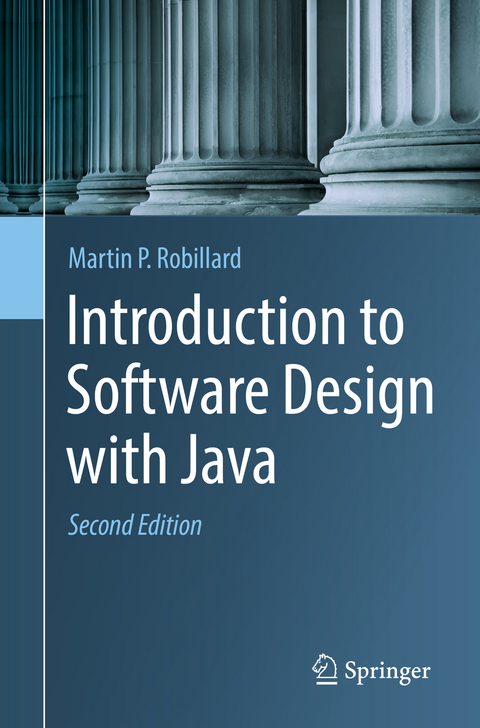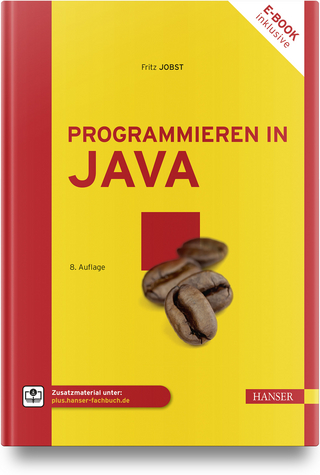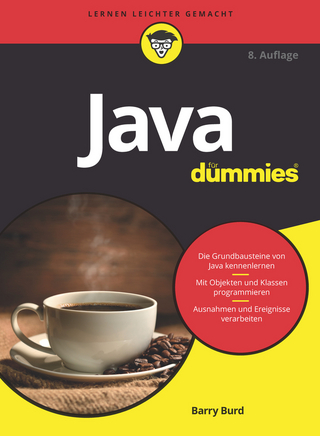
Introduction to Software Design with Java
Springer International Publishing (Verlag)
978-3-030-97898-3 (ISBN)
This textbook provides an in-depth introduction to software design, with a focus on object-oriented design, and using the Java programming language. Its goal is to help readers learn software design by discovering the experience of the design process. To this end, the text follows a continuous narrative that introduces each element of design know-how in context, and explores alternative solutions in that context. This narrative is complemented by hundreds of code fragments and design diagrams.
The first chapter is a general introduction to software design and the subsequent chapters cover design concepts and techniques. The concepts and techniques covered include interfaces, encapsulation, inheritance, design patterns, composition, functional-style design, unit testing, and many more. A major emphasis is placed on coding and experimentation as a necessary complement to reading the text. To support this aspect of the learning process, a companion website with practice exercises is provided, as well as two complete sample applications. Guidance on these sample applications is provided in "Code Exploration" insets throughout the book. Although the Java language is used as a means of conveying design-related ideas, the book's main goal is to address concepts and techniques that are applicable in a host of technologies.
This second edition covers additional design techniques such as input validation and dependency injection. It also provides extended and revised treatment of many core subjects, including polymorphic copying, unit testing, the Observer pattern, and functional-style programming.
This book is intended for readers who have a minimum of programming experience and want to move from writing small programs and scripts to tackling the development of larger systems. This audience naturally includes students in university-level computer science and software engineering programs. As the prerequisites to specific computing concepts are kept to a minimum, the content is also accessible to programmers with no previous background in computing. In a similar vein, understanding the code fragments requires only a minimal grasp of the Java language, such as would be taught in an introductory programming course.lt;p>Martin Robillard is a Professor of Computer Science at McGill University. He has been teaching software design with Java since 2005, and has over two decades of programming experience. His research focuses on the human aspects of software engineering, including knowledge transfer, developer training, and documentation generation. Martin served as the Program Co-Chair for the 20th ACM SIGSOFT International Symposium on the Foundations of Software Engineering (FSE 2012) and the 39th ACM/IEEE International Conference on Software Engineering (ICSE 2017).
1. Introduction.- 2. Encapsulation.- 3. Types and Interfaces.- 4. Object State.- 5. Unit Testing.- 6. Composition.- 7. Inheritance.- 8. Inversion of Control.- 9. Functional Design.
| Erscheinungsdatum | 05.05.2022 |
|---|---|
| Zusatzinfo | XII, 300 p. 100 illus., 16 illus. in color. |
| Verlagsort | Cham |
| Sprache | englisch |
| Maße | 155 x 235 mm |
| Gewicht | 480 g |
| Themenwelt | Informatik ► Programmiersprachen / -werkzeuge ► Java |
| Mathematik / Informatik ► Informatik ► Software Entwicklung | |
| Informatik ► Theorie / Studium ► Compilerbau | |
| Schlagworte | Design Patterns • Java • software architecture • software development • Software engineering • Software Testing |
| ISBN-10 | 3-030-97898-2 / 3030978982 |
| ISBN-13 | 978-3-030-97898-3 / 9783030978983 |
| Zustand | Neuware |
| Informationen gemäß Produktsicherheitsverordnung (GPSR) | |
| Haben Sie eine Frage zum Produkt? |
aus dem Bereich


